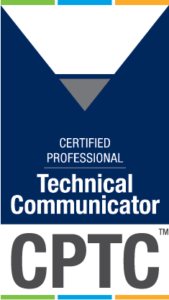By Kimi Sugeno | STC Member
Thinking about pursuing CPTC certification, but not sure what to expect? When I first started attending STC events a few years ago, several of us were new to the field and discussed getting certified. A few of us registered for the exam, and then spent the following months discussing what we had (and had not!) done to prepare.
As an aid to others considering certification, here are some notes from my experience.
 Register for the exam. Your registration is good for a year, so you don’t have to wait to register until you’re ready to take the exam. The year goes fast! If you’re a procrastinator like me, work back from the expiration date, making sure you leave time to read and study the 600-page book.
Register for the exam. Your registration is good for a year, so you don’t have to wait to register until you’re ready to take the exam. The year goes fast! If you’re a procrastinator like me, work back from the expiration date, making sure you leave time to read and study the 600-page book.
Buy/rent the book. It’s worth it. The information is detailed and specific to the exam. It’s not necessarily common sense or information you would pick up in daily work.
Take the practice exam. Why?
- It’s humbling. I’ve been in the publishing field for many years, so I figured it shouldn’t be too difficult. Did I pass the first time I tried the practice exam? No.
- It helps guide your reading/study. Seeing the types of questions on the practice exam will give you a sense of the breadth and depth of the coverage. In my experience, it’s all important, and anything in the book might be on the exam.
- It familiarizes you with the test environment. The online exam is pretty intuitive, but why waste time learning the site on test day?
Review the Study Guide. Doing this before you dive into the book will help you focus on key items to digest. I must admit, though, that I paid less attention to the syllabus and more to the mechanics of the exam described in the later sections of the Study Guide.
Read the book. It seems repetitive, but there are differences across the various communication types. Learn the basics, then look for the differences.Read the entire book. Did I mention exam fodder could come from anywhere in the book? There’s a section on proofreading marks at the end that I barely glanced at. I’ve been in publishing my entire career, but there was a proofreading mark on the exam I had never seen before.
Study, study, study. I found the general concepts fairly easy to learn, but since there are subtle differences between the types of communication, I spent a good amount of time studying. For me, it was time well spent, since many of the exam questions targeted those subtle differences.
Schedule your exam. This part is easy—there are proctors available almost 24/7 (I think they took a break on Christmas). Before test day, test your system to make sure your camera and microphone work well. Have spare batteries on hand for anything wireless.
On test day, access the proctor system. Mentally prepare for some set-up time before you actually start the exam. As the exam time approached, I did some last-minute cramming so the details would be fresh. After logging in and waiting a few minutes to connect with a proctor, we went through a number of set-up steps including showing my ID and panning my camera to show my monitor, desk, floor, and walls. Because I did not expect this to take so long, it was a little distracting.
Take the exam. Watch the time; it went much faster for me than when I took the practice exam. Answer the questions you know and then loop back to work on the ones that will take more time. After the exam, your pass/fail status will be displayed on the screen. Take a screen shot, since you won’t get another notification until your results are confirmed.
Await confirmed results. You should receive your confirmed results via email in about two working days. It may take a few more days for your certificate to be available for download. And finally, it took a few weeks for the certificant list on the STC website to be updated.
What’s next. If you passed, congratulations! Don’t forget about those CEU requirements to keep your certification current. You can get points for a number of different activities, including writing articles for Intercom.
KIMI SUGENO (kimi.sugeno@gmail.com) is a Project Analyst at SAGE Publications. She has been an accidental technical communicator working on content systems and online publishing platforms in the course of a career in the publishing industry.



Here’s a tip — join a study group or create a study group with your chapter.